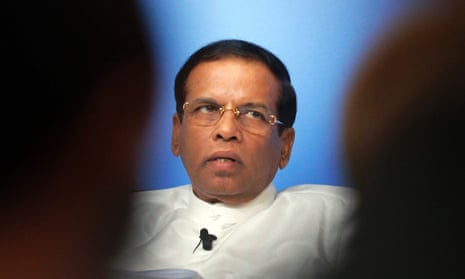Sri Lanka will begin hanging drug dealers, ending a near-half-century moratorium on executions, as officials promised explicitly to “replicate the success” of the Philippines’ grisly war on drugs.
Sri Lanka’s decision to cite the Philippines as its model is certain to draw criticism. Under president Rodrigo Duterte 4,200 drug suspects have been killed in the Philippines, although rights groups say the true number could be at least triple that figure.
Announcing his decision to follow Duterte’s example, the Sri Lankan president, Maithripala Sirisena, had told his cabinet he “was ready to sign the death warrants” of repeat drug offenders, according to his spokesman Rajitha Senaratne.
“From now on, we will hang drug offenders without commuting their death sentences,” he said.
Sri Lanka has commuted death sentences for serious crimes to life in prison since 1976, when the last execution took place.
Senaratne said there were 19 drug offenders whose death sentences had been commuted to life. Local media reports quote Senaratne as saying that they would now face execution.
Authorities say a tougher approach is needed to combat what they report as an increase in drug-related crime.
Senaratne cited a case this week in which a convicted drug dealer, whose death sentence had been commuted to life, had arranged the import of 100kg of heroin from behind bars.
“We were told that the Philippines has been successful in deploying the army and dealing with this problem. We will try to replicate their success,” Senaratne said.
Sri Lankan ministers have cited a growing drugs problem in the country for the decision. They say the country has become an increasingly important transhipment point for smuggling narcotics.
In 2016 Sri Lanka’s Police Narcotics Bureau seized more than 900kg of cocaine from an Indian-bound ship in Colombo, reportedly one of the largest seizures of the drug in the region.
Sri Lanka’s defence minister, Ranjith Madduma Bandara, suggested that the country’s armed forces be drafted in for a limited period to be used for drug enforcement.
The decision to end the moratorium on executions in Sri Lanka comes despite efforts by local human rights groups in 2016 to persuade the current president to formally revoke the death penalty.
